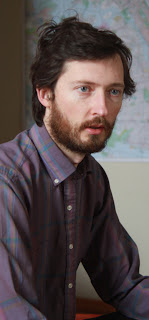
Another attempt, and not a particularly successful one, at joining documentary with narrative (
why is this marriage neces-sary or worthwhile?),
PUTTY HILL by writer/director
Matt Porterfield, who earlier gave us
Hamilton, has received a surprising amount of main-stream press for a film destined to reach few mainstream audiences, with those seeing it likely to emerge from the experience scratching their heads. As some of my compatriots stood around, post press-screening, scratching
ours, one of us --
Michael Lee of
Film-Forward.com -- noted that the movie is made up of a number of interesting scenes, any of which works pretty well on its own. Yet together, they don't add up to much.
The main invention here, so far as mumblecore is concerned (the genre of which I would categorize
Putty Hill as part of) is the addition of a narrator/
interviewer who, by default, becomes a kind of character in the film. We never see him, though we hear him asking questions of various characters we meet along the way. Like so much of the movie, however, this charac-ter disappears at some point, never to return, as though he were not all that important in the first place. Mr. Porterfield, pictured at left, makes him an interesting touch that, like the movie itself, doesn't finally go anywhere or provide much edification.

The content of the movie, set on the outskirts of Baltimore, has to do with a funeral being organized for a dead drug addict, an evidently well-liked (by some) young man with lots of friends and relatives, some of whom we meet here. Unfortunately there is little connecting tissue to hold the scenes together. A character from one might appear in another, and the dead boy, of course, provides a kind of ballast; even so, the film begins to seem ever more arbitrary. The interviewer, too -- who initially appears to be something/someone new to the genre, eventually grows annoying because he, along with whom he chooses to interview and why the filmmaker even bothered with him to begin with -- seems arbitrary.

In the press material for the film, Porterfield notes that his is an "approach to realism in opposition to the anthropological, lyrical and romantic currents present in most of the genre." Hence, I suppose, the "documentary" feel of the work. Yet I would suggest that the filmmaker incorporates all three currents, but in his own more paltry manner -- anthropology (the interviewer), lyricism (the "nature" scenes) and romance (all that's told us is of "failed" romance, but that, I submit, still counts). He certainly cannot be accused of sentimentality. Nor of much else, either. He claims to be no fan of exposition, yet we get plenty of it via the interviewer and the talking heads he meets and greets. In fact, on one level the whole movie is exposition, which may accounts for some of the boredom that eventually sets in.

Performances by the mostly non-pro cast seem exactly that. This works well enough in delivering that kind of "documentary"-type acting that often passes for truthfulness on film. The "lead" role (though to my mind there is no real lead in this film) is given to
Sky Ferreira, above, who acquits herself well but does not approach what I'd call memorable. Still, the PR materials refer to her as "the 18-year-old sultry electro-pop newcomer who will release her debut album in the U.S. in 2011," so at least we have synchronicity here.
TrustMovies is reacting more negatively to
Putty Hill than the film deserves, and I admit that this is in part due to the rather amazing press it has garnered in advance of release. As my compatriot Mr. Lee (mentioned in the opening paragraph) states, a number of the scenes in this movie do work and quite well. The paint-ball match that marks the beginning of the film is very well done; likewise the dialog between grandmother and (I think) granddaughter (shown above). The at-home tattoo-parlor (below) should garner a lot of interest, too. As annoyed as the movie made me, I acknowledge Mr. Porterfield's skills and would like to see them increase. (I'll also try to view his earlier
Hamilton, which I've just discovered one can
stream via
Netflix.)
I do take exception to the filmmaker's penultimate scene, however -- and in a
big way. Filmed in an old, dark house in which the electricity has been turned off -- at night, 'natch -- two girls engage in snooping and chatting while we viewers can't see a god-damned thing. This, I suggest, is deliberately obfuscatory, sloppy film-making that goes on, it seems, for-fucking-
ever. And it's totally unnecessary. If Porterfield wanted to access the "truth" of a no-lights-in-the-house scene, why not have an unlighted candle-in-candelholder on hand, which the characters can find in the attic, and to which the proper response becomes, "Gotta match?"
Putty Hill opens Friday, February 18 in New York City at the
Cinema Village and will also play in
Baltimore (that's only fair),
Columbus,
Los Angeles, and
Omaha. Click the city to learn the venue, and/or click
here then scroll down to see any further upcoming playdates....
Social Notes of interest:
Filmmaker Matt Porterfield will be in attendance for all Q&A's at Cinema Village (22 East 12 Street, NYC).
Friday 2/18
6:30pm, Yance Strickler (Kickstarter) for a fundraiser discussion
8:30pm, Jonathan Caouette (Tarnation) with Putty Hill crew and Sky Ferrira
10:30pm, Yance Ford (POV) and Esther Robinson (ArtHome, Danny Williams: A Walk Into the Sea), the Heterodox team
Afterparty: Café Select for industry and friends with large Putty photos and behind the scenes footage, great DJ line-up!
Music by Justine D, Chris Keating (Yeasayer), Matt Papich (Ecstatics, Meters Delight) and Kari Altmann (blackmoth.org)
RSVP only: puttyhillmovie@gmail.com
Saturday 2/19
*Surprise daytime Q&A with Gordon Porterfield (writer-father of the filmmaker)
6:30pm, Jeronimo Rodriguez (NY1 News)
8:30pm, Richard Brody (The New Yorker)
10:30pm, Amos Poe (filmmaker)
Afterparty: The Beauty Bar (231 E 14th St off 3rd Ave)
Sunday 2/20
6:30pm, Amy Dotson (IFP)
8:30pm, Chris Keating (Yeasayer)
10:30pm, Jem Cohen (filmmaker) with Putty Hill crew
Afterparty: Lit Lounge (93 2nd Ave off 6th St) with Dope Body, Dustin Wong (Ponytail) & Co La (Matt Papich).































